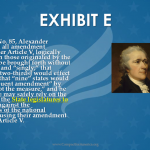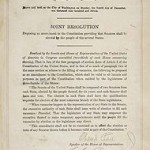On June 21, 1788. New Hampshire was the ninth state to ratify the United States Constitution. Pursuant to the Constitution’s Article VII New Hampshire’s ratification put the Constitution officially in effect. Although New Hampshire ratified, the delegates to its ratification convention clearly had reservations. The ratification message included a dozen suggestions for constitutional amendments pursuant to Article […]
Compact for America Solution to Article V Convention Issues According to the Founders, Part II
This the second in a series of articles that examine the Founders’ opinions on how the Article V Convention process should have clear focus. The US Constitution’s Article V provides two methods for proposing constitutional amendments. The Compact for America is an initiative to employ the method that has not been used: a convention of […]
Compact for America Solution to Article V Convention Issues According to the Founders, Part I
The goal of the Compact for America (“CFA”) initiative is for the states to propose and ratify the powerful balanced budget amendment that is contained in the Compact for a Balanced Budget into the United States Constitution in as little as one session year, with a target of July 4, 2017, and a “do or die” date of April […]
The Seventeenth Amendment: Destroying State Sovereignty
From 1789 to 1913 the power to choose United States Senators was vested by the Constitution in the State legislatures. The Seventeenth Amendment altered the process by providing for direct election of Senators by the people. This fundamentally altered a carefully balanced power structure built into the unamended Constitution that served important purposes: to limit federal power […]
The Tenth Amendment to the US Constitution
“The Tenth Amendment is the foundation of the Constitution.” – Thomas Jefferson Among the questions raised by opponents of the Constitution during the ratification debates was the lack of an express limit on federal power, and that it would be a danger to individual freedoms and to the powers of the states. In response to […]
Constitution’s 18th Amendment: Prohibition Leads to National Police Force
Amendments to the US Constitution have generally been of three types: expansion of citizen protections from government interference with their lives, providing greater participation in the process of government or technical government organization. Only the Eighteenth Amendment acted as a restriction on freedom and it has been the only amendment repealed. The Bill of Rights set specific […]
US Constitution’s Twenty-Seventh Amendment: 202 Years in the Making
The First Freedom of the First Amendment is the Freedom of Religion. The Right to Bear Arms is famously in the Second Amendment. The American Bill of Rights has an almost majestic quality by being composed of ten amendments, recalling the structure of the Ten Commandments. But the 1789 Congress submitted twelve amendments drafted by […]
Article V of the US Constitution: Amendments
The Founding Fathers worked hard to come up with a Constitution that would stand the test of time. They had both the foresight and humility to know that with changing times there would be a need to change the charter for the US government. Beyond that, the Declaration of Independence had asserted the People possessed […]














Compact for America Solution to Article V Convention Issues According to the Founders, Part III
The preceding Part I and Part II, containing Exhibits A through G overwhelmingly establish the laser-focus of the Compact for America approach on advancing and ratifying a specific amendment is four-square what the Founders expected from Article V. Simply put, the Founders clearly meant for the Article V convention’s agenda to be set in fine detail […]